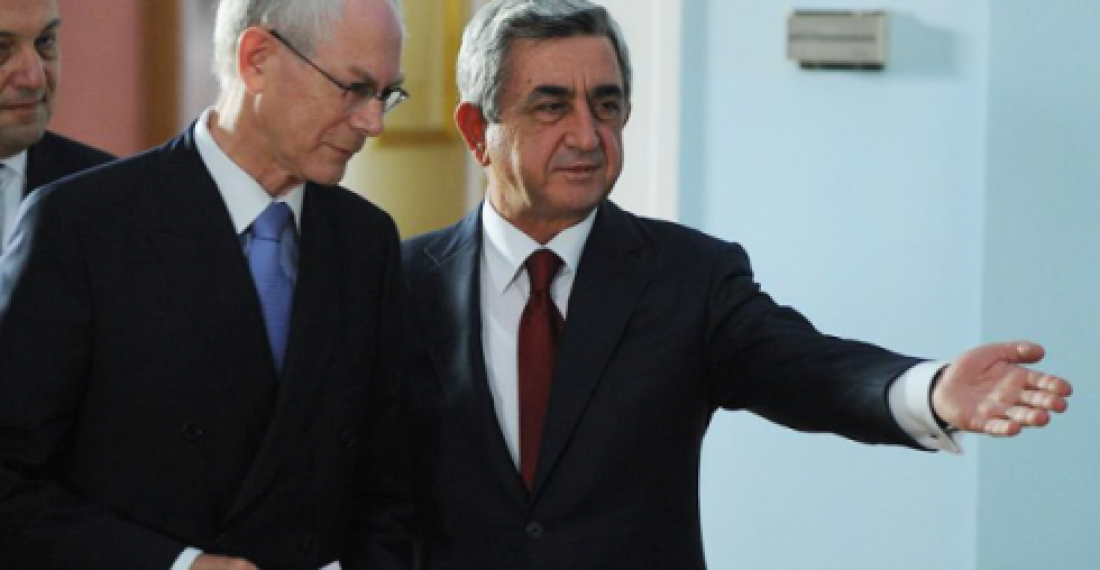Herman Van Rompuy, President of the European Council, today travels to Azerbaijan for the last lap of his official visit to the countries of the South Caucasus.
On Wednesday morning, he was in Armenia, and held separate meetings with both the Parliamentary Speaker Hovik Abrahamyan and President Serzh Sargsyan, as well as addressing the National Assembly, and making a speech at the civil society forum "Armenia in Europe".
Both in his speech to parliamentarians, and at a press conference following his talks with the Armenian President, Mr Van Rompuy discussed the development of EU-Armenia ties. Discussions on the Association Agreement are moving forward, and negotiations have recently begun on a free trade agreement. Initial steps are also being taken towards liberalisation of the visa regime. Within this context, he praised Armenia's efforts to assimilate certain core values of the EU, namely political transparency, the eradication of corruption, and the promotion of human rights, noting, however, that there was some way still to go - for instance, with regard to certain issues of electoral transparency as identified by the OSCE/ODIHR Election Observation Mission.
In recognition of both progress and problems, Mr Van Rompuy announced a boost of 15 million euros to the EU's support for Armenia with the framework of the Eastern Partnership Integration and Cooperation Programme, in a targeted attempt to support further reforms.
On Nagorno-Karabakh, Van Rompuy expressed his concern over the reported ceasefire violations and consequent casualties and fatalities on both sides, and reiterated the international community's belief that military force offers no solution to the issue. In line with the EU's recent assertion of a greater role for itself in the resolution of the conflict, he said: "The EU stands ready to support any confidence building and reconciliation efforts. We have both the means and the experience to do so. The appointment of Ambassador [Philippe] Lefort as the new EU Special Representative for the South Caucasus and the crisis in Georgia shows the increasing commitment of the EU".
Earlier addressing the Armenian Parliament, Van Rompuy said:
"The path of prosperity, sustained development and security is also the path of genuine reforms, democracy and peace. Progress in the resolution of the regional conflict will have a positive impact on the growth and investment potential of Armenia and of the region, since it will encourage confidence from investors and partners, allowing you to enjoy the rewards which this great nation should be enjoying. What is needed now is more trust, more contacts, more confidence-building. The status quo is no option. Without trust, there will never be peace. And trust will depend on both sides showing leadership and compromise. Every effort -- every small step -- towards a peaceful, negotiated settlement will bring the entire region closer to the secure and prosperous future that its citizens deserve."
Mr Van Rompuy's visit, his first to the region, has been greeted positively by the Armenian political establishment. At their joint press conference, President Sargsyan remarked that "Such a high-level visit from the European Union seriously encourages further deepening and expansion of our relations. We have had a sincere and useful discussion with Mr. Van Rompuy on bilateral and regional issues. I should note that we have an overall mutual understanding regarding all issues on our agenda".
Parliamentary Speaker Hovik Abrahamyan, meanwhile, emphasised that Armenia "has made big efforts to build a democratic country based on European systemic values and deepen the relations with the European Union, and we have recorded tangible success. Armenia’s aspiration to develop with European values, principles and standards also enjoys universal consensus in our society".
After leaving Yerevan, Mr Van Rompuy travelled to Georgia to meet Parliamentary Chairman David Bakradze and President Mikheil Saakashvili.
source: commonspace.eu
photo: Armenian President Serzh Sargsyan greeting the president of the European Council, Herman van Rompuy in Yerevan on 4 July (picture courtesy of the press Service of the President of Armenia).







